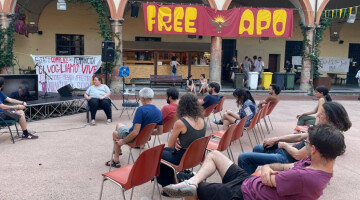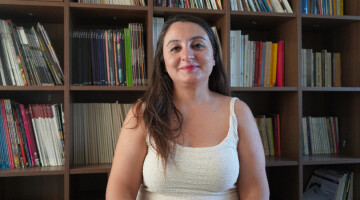Italian director Benedetta Argentieri received the Phoenix Award at the 32nd Cologne Film Festival for her documentary "The Matchmaker". She dedicated the award to the “brave people of North and East Syria.”
The director attended the 2nd International Women's Conference organized by the ‘Network Women Weaving the Future’ in Berlin on November 5-6 the motto "Our Revolution: Liberating Life". ANF spoke with the Italian director about her latest documentary, the chemical attacks of the Turkish state against the Kurdistan Freedom Forces and the role of intellectuals.
You have participated in both conferences. How can you describe the differences or improvements between the two conferences in terms of the outcomes?
Yes, of course, almost 5 years have passed between the two conferences. Not just the Kurdish women's movement, but all the movements have been more and more focused on what is happening in Kurdistan, and the Kurdish Women's Movement has started to lead their way to building a free life, for an alternative system, for everything we want to seek as free women to liberate ourselves from the system we live in. There are more participants at this conference, a little bit larger than in Frankfurt. I think a lot of different women around the world are looking forward to these last discussions about how to go forward, and I think that's very important.
You are a journalist and a documentary filmmaker, and you especially focus on the women's movements in the Middle East and violence against women. You won the Phoenix Best Documentary Award in Cologne for your latest documentary, The Matchmaker. What message did you want to give?
It was very important for me to dedicate this award to the peoples of North-East Syria, because with the Ukraine war everything else disappeared from the mainstream media. Now, everybody is kind of focusing on the Ukrainian war but forgetting all the rest of the world. There are 488 conflicts around the world. This is also what Nilüfer Koç said about. And it's very important to focus on North-East Syria and in Kurdistan, especially because of the attacks I just mentioned. But also, it's very important to remind all the European states that there are thousands of ISIS-affiliated people, especially women that are travelling from all European countries to Syria to join ISIS and they are just left there. They are not able to go back to their countries. Their countries don’t want them back.
So, everything is left on the shoulders of the Autonomous Administration of North-East Syria. This we cannot let happen because these nation-states and European countries have responsibilities towards their citizens. And leaving them in North-East Syria while it is constantly under attack by the Turkish state is also a further problem and it is also a threat to the civilians, to all the alternative system and democratic confederalism that is being built in North-East Syria. So, the idea of dedicating the award to the peoples of North-East Syria was to refocus on the people there and to highlight these problems that are very important.
Turkey is also using chemical weapons against the Kurdish freedom forces. What message would you like to give to the world's peoples, artists and intellectuals against this state violence?
Chemical attacks have been going on for a very long time. And the Turkish state, since it is unable to defeat the guerrilla movement in the mountains of Kurdistan, is using chemical weapons that are forbidden by international conventions and despite the fact that the Turkish state is a NATO country, and nobody is saying anything about this. They refuse e to see what is happening.
And this is also connected to the constant isolation of Abdullah Öcalan in the prison of Imrali where he has been detained for more than 22 years, since he was kidnapped in 1999. And about his isolated condition, many people have raised concerns, and not just concerns, but all the problems of this kind of detention that is inhumane. But nobody from the international community is saying anything, and this is a complete contradiction to what's happening.
We see how all over the world the slogan “Jin, Jiyan, Azadi” (Woman, Life, Freedom) is praised. Without connecting it to the Kurdish Freedom Movement and without connecting it to Abdullah Öcalan, this is a complete contradiction. It is important for artists and for all the friends of Kurdistan, but not just Kurdistan, anyone who wants a free life to remind what is happening in the mountains of Kurdistan, what is happening in İmralı, and to demand the liberation of Abdullah Öcalan. Now, he is being embraced as a philosopher for many people, not only just the Kurdish people, and it's time for his liberation.














